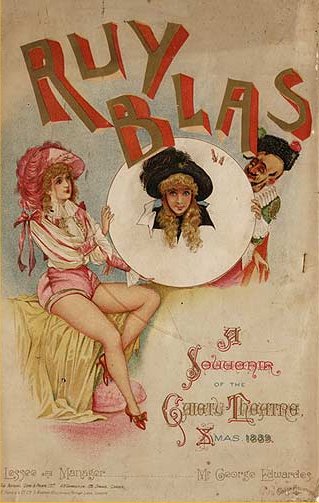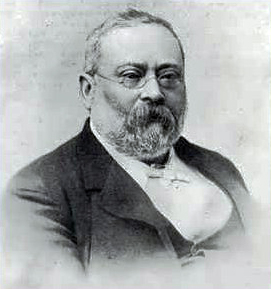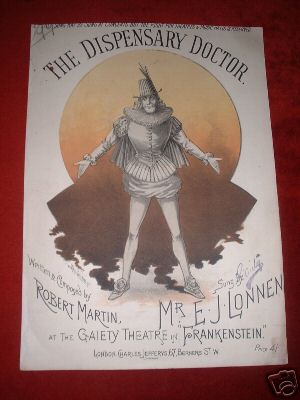
Frederick George Hobson, known as Fred Leslie, was an English actor, singer, comedian and dramatist.

George Joseph Edwardes was an English theatre manager and producer of Irish ancestry who brought a new era in musical theatre to the British stage and beyond.

The Gaiety Theatre was a West End theatre in London, located on Aldwych at the eastern end of the Strand. The theatre was first established as the Strand Musick Hall in 1864 on the former site of the Lyceum Theatre. In 1868, it became known as the Gaiety Theatre and was, at first, known for music hall and then for musical burlesque, pantomime and operetta performances. From 1868 to the 1890s, it had a major influence on the development of modern musical comedy.

Dorothy is a comic opera in three acts with music by Alfred Cellier and a libretto by B. C. Stephenson. The story involves a rake who falls in love with his disguised fiancée.

Victorian burlesque, sometimes known as travesty or extravaganza, is a genre of theatrical entertainment that was popular in Victorian England and in the New York theatre of the mid-19th century. It is a form of parody in which a well-known opera or piece of classical theatre or ballet is adapted into a broad comic play, usually a musical play, usually risqué in style, mocking the theatrical and musical conventions and styles of the original work, and often quoting or pastiching text or music from the original work. Victorian burlesque is one of several forms of burlesque.
In Town is a musical comedy written by Adrian Ross and James T. Tanner, with music by F. Osmond Carr and lyrics by Ross. The plot of In Town, though thin, is a smart tale of backstage and society intrigue. One of the popular songs from the show was "The Man About Town".

Ruy Blas and the Blasé Roué is a burlesque written by A. C. Torr and Herbert F. Clark with music by Meyer Lutz. It is based on the Victor Hugo drama Ruy Blas. The piece was produced by George Edwardes. As with many of the Gaiety burlesques, the title is a pun.

Cinder Ellen up too Late is a musical burlesque written by Frederick Hobson Leslie and W. T. Vincent, with music arranged by Meyer Lutz from compositions by Lionel Monckton, Sidney Jones, Walter Slaughter, Osmond Carr, Scott Gatti, Jacobi, Robertson, and Leopold Wenzel. Additional lyrics were written by Basil Hood. The show was a burlesque of the well-known pantomime and fairy tale, Cinderella.

Wilhelm Meyer Lutz was a German-born British composer and conductor who is best known for light music, musical theatre and burlesques of well-known works.

Frankenstein, or The Vampire's Victim is a musical burlesque in three acts written by Richard Henry. The music was composed by Meyer Lutz. The piece is a burlesque loosely based on the 1818 Mary Shelley novel Frankenstein; or, The Modern Prometheus and the Adelphi Theatre drama based on the novel.

Galatea, or Pygmalion Re-Versed is a musical burlesque that parodies the Pygmalion legend, and specifically W. S. Gilbert's 1871 play Pygmalion and Galatea. The libretto was written by Henry Pottinger Stephens and W. Webster. The score was composed by Wilhelm Meyer Lutz.

Faust up to Date is a musical burlesque with a libretto was written by G. R. Sims and Henry Pettitt, and a score written by Meyer Lutz. Set in Nuremberg, it is a spoof of Gounod's opera, Faust, which had first been performed in London in 1864. The burlesque followed on from an earlier Lutz musical, Mephistopheles, or Faust and Marguerite.

Ellen "Nellie" Farren was an English actress and singer best known for her roles as the "principal boy" in musical burlesques at the Gaiety Theatre in London.

John Hollingshead was an English theatrical impresario, journalist and writer during the latter half of the 19th century. After a journalism career, Hollingshead managed the Alhambra Theatre and was later the first manager of the Gaiety Theatre, London. Hollingshead also wrote several books during his life.

Little Jack Sheppard is a burlesque melodrama written by Henry Pottinger Stephens and William Yardley, with music by Meyer Lutz, with songs contributed by Florian Pascal, Corney Grain, Arthur Cecil, Michael Watson, Henry J. Leslie, Alfred Cellier and Hamilton Clarke. The comedy lampooned the serious plays based on the life of Jack Sheppard, especially the popular 1839 play by John Buckstone, which was in turn based on the novel of that year by William Harrison Ainsworth.

Edwin Jesse Lonnen, credited as "E. J." or "Teddy", was an English actor, comedian and singer known for his performances in musical burlesques, operettas and musical comedies, particularly at the Gaiety Theatre, London at the end of the Victorian era.

Frederick John D'Auban was an English dancer, choreographer and actor of the Victorian and Edwardian eras. Famous during his lifetime as the ballet-master at the Theatre Royal, Drury Lane, he is best remembered as the choreographer of many of the Gilbert and Sullivan operas.
Miss Esmeralda is a Victorian burlesque, in two acts, with music by Meyer Lutz and Robert Martin and a libretto by Fred Leslie, under his pseudonym "A. C. Torr", and Horace Mills. It is based on Victor Hugo's novel Notre Dame de Paris.

Monte Cristo Jr. was a Victorian burlesque with a libretto written by Richard Henry, a pseudonym for the writers Richard Butler and Henry Chance Newton. The score was composed by Meyer Lutz, Ivan Caryll, Hamilton Clarke, Tito Mattei, G. W. Hunt and Henry J. Leslie. The ballet and incidental dances were arranged by John D'Auban, and the theatre's musical director, Meyer Lutz, conducted. The play's doggerel verse was loosely based on The Count of Monte Cristo by Alexandre Dumas.

The Bohemian G-yurl and the Unapproachable Pole is a musical burlesque in two acts, with a score by Meyer Lutz to a libretto by Henry James Byron, which played under the management of John Hollingshead at the Gaiety Theatre in London in 1877. It was a parody of the popular opera The Bohemian Girl composed by Michael William Balfe with a libretto by Alfred Bunn.

















